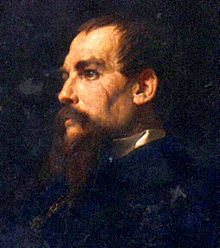'via Blog this'For other people named Richard Burton, see Richard Burton (disambiguation).
| Sir Richard Francis Burton | |
|---|---|
 Sir Richard Burton, portrait by Frederic Leighton, National Portrait Gallery | |
| Born | 19 March 1821 Torquay, Devon, England |
| Died | 20 October 1890 (aged 69) Trieste, Austria-Hungary |
| Resting place | St. Mary Magdalen's Church,London, England |
| Nationality | British |
| Known for | Exploration, Writing, Languages, Orientalist |
| Spouse | Isabel Burton (m. 1861–1890) |
Captain Sir Richard Francis Burton KCMG FRGS (19 March 1821 – 20 October 1890) was a British geographer, explorer, translator, writer,soldier, orientalist, cartographer, ethnologist, spy, linguist, poet, fencerand diplomat. He was known for his travels and explorations within Asia, Africa and the Americas, as well as his extraordinary knowledge of languages and cultures. According to one count, he spoke 29 European, Asian and African languages.[1]
Burton's best-known achievements include traveling in disguise to Mecca, an unexpurgated translation of One Thousand and One Nights (also commonly called The Arabian Nights in English after Andrew Lang's abridgement), bringing the Kama Sutra to publication in English, and journeying with John Hanning Speke as the first Europeans to visit theGreat Lakes of Africa in search of the source of the Nile. Burton extensively criticized colonial policies (to the detriment of his career) in his works and letters. He was a prolific and erudite author and wrote numerous books and scholarly articles about subjects including human behaviour, travel, falconry, fencing, sexual practices and ethnography. A unique feature of his books is the copious footnotes and appendices containing remarkable observations and information.
He was a captain in the army of the East India Company, serving in India (and later, briefly, in the Crimean War). Following this, he was engaged by the Royal Geographical Society to explore the east coast of Africa and led an expedition guided by the locals and was the first European to see Lake Tanganyika. In later life, he served as British consul inFernando Po, Santos, Damascus and, finally, Trieste. He was a Fellow of the Royal Geographical Society and was awarded aknighthood (KCMG) in 1886.



No comments:
Post a Comment